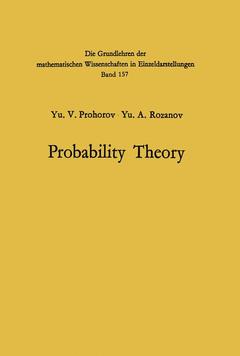Description
Probability Theory, Softcover reprint of the original 1st ed. 1969
Basic Concepts · Limit Theorems Random Processes
Coll. Grundlehren der mathematischen Wissenschaften, Vol. 157
Authors: Prohorov Jurij Vasil'evic, Rozanov Jurij Anatol'evic
Language: French
Subject for Probability Theory:
Keywords
89.66 €
In Print (Delivery period: 15 days).
Add to cart
Publication date: 05-2012
406 p. · 15.5x23.5 cm · Paperback
406 p. · 15.5x23.5 cm · Paperback
Description
/li>Contents
/li>
The aim of this book is to serve as a reference text to provide an orientation in the enormous material which probability theory has accumulated so far. The book mainly treats such topics like the founda tions of probability theory, limit theorems and random processes. The bibliography gives a list of the main textbooks on probability theory and its applications. By way of exception some references are planted into the text to recent papers which in our opinion did not find in monographs the attention they deserved (in this connection we do not at all want to attribute any priority to one or the other author). Some references indicate the immediate use of the material taken from the paper in question. In the following we recommend some selected literature, together with indications of the corresponding sections of the present reference book. The textbook by B. V. Gnedenko, "Lehrbuch der Wahrscheinlichkeits theorie " , Akademie-Verlag, Berlin 1957, and the book by W. Feller, "IntroductioI). to Probability Theory and its Applications", Wiley, 2. ed., New York 1960 (Chapter I, § 1 of Chapter V) may serve as a first introduction to the various problems of probability theory. A large complex of problems is treated in M. Loeve's monograph "Probability Theory", Van Nostrand, 2. ed., Princeton, N. J.; Toronto, New York, London 1963 (Chapters II, III, § 2 Chapter VI). The foundations of probability theory are given in A. N. Kolmogorov's book "Grund begriffe der Wahrscheinlichkeitsrechnung", Springer, Berlin 1933.
I Basic Concepts of Elementary Probability Theory.- § 1. Experiments with Equally Probable Outcomes.- § 2. The Space of Elementary Events and the Law of Composition of Probabilities.- § 3. The Relation between Various Events.- § 4. Random Variables.- § 5. Some Probability Distributions.- II Spaces and Measures.- § 1. Some Facts about Measurable and Topological Spaces.- § 2. Distributions and Measures.- § 3. Measures and Integrals.- III Basic Concepts of Probability Theory.- § 1. Spaces of Elementary Events. Probability Distributions and Characteristic Functions.- § 2. Basic Types of Random Processes.- IV Limit Theorems in Probability Theory.- § 1. Distributions and their Characteristic Functions.- § 2. Estimates of the Nearness of Distributions in Terms of the Nearness of their Characteristic Functions.- § 3. Moments and Semi-Invariants.- § 4. Infinitely Divisible Distributions and their Connection with Limit Theorems.- § 5. Sequences of Independent Random Variables (General Properties).- § 6. Sequences of Independent Random Variables. Convergence to the Normal Law.- § 7. Sequences of Independent Random Variables. Convergence to Stable Laws.- § 8. Local Theorems for Lattice-Distributions.- § 9. Local Theorems for Densities.- § 10. Probabilities of Large Deviations. Inequalities and Asymptotic Formulas.- § 11. Concluding Remarks.- V Markov Processes.- § 1. Markov Processes with a Finite or Denumerable Number of States (Markov Chains).- § 2. Branching Processes.- § 3. Random Processes with Independent Increments.- § 4. Diffusion Processes.- § 5. General Markov Processes and their Characteristics.- § 6. Controlled Markov Processes.- VI Stationary Processes.- § 1. Spectral Theory of Harmonizable Processes.- § 2. Stationary Processes in theStrict Sense.- § 3. Stationary Gaussian Processes.- § 4. Elements of the Mathematical Theory of the Transmission of Information through Stationary Communication Channels.
© 2024 LAVOISIER S.A.S.
These books may interest you

Handbook of Probability 161.06 €



